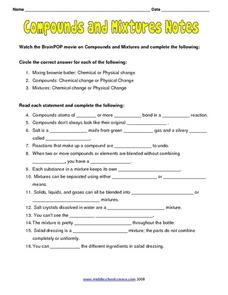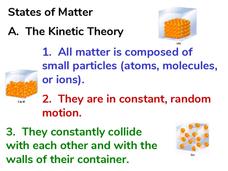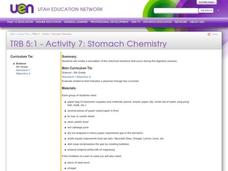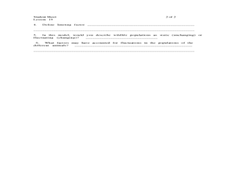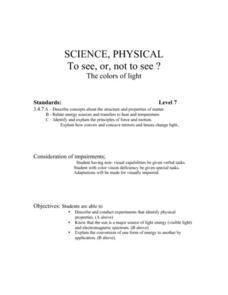California Academy of Science
Carbon Cycle Role Play
Anytime you make concepts clear with role playing or hands-on experience, it's a win for the whole class. Ping-Pong balls are used to represent carbon in a carbon cycle role-play activity. In small groups, children first discuss what...
Curated OER
Lead and Mercury Ion Catalase Inhibition
Students participate in a laboratory investigation in which they observe the effect of temperature and pH on enzyme activity. Students also examine exposure to heavy metal ions and the effect that may have on enzyme activity.
Curated OER
Fingerprinting Lab
Learners recover latent prints by iodine fuming, cyanoacrylate fuming, and dusting with powder, after a lecture/discussion on fingerprinting techniques. They each provide a fingerprint for identification by another student. A database of...
Curated OER
Properties of Fresh and Sea Water
Students work with three stations to demonstrate the properties of water. They explore water's boiling point, freezing point, and its ability to store heat.
Curated OER
The Nature of Salt
High schoolers record information from the periodic table for sodium and chloride. They determine whether salts are molecular or ionic compounds, along with sodium chloride's molecular weight, and relative weights
Teach Engineering
Equal and Opposite Thrust in Aircraft: You're a Pushover!
It's the law—every action requires a reaction, no matter how small. Pupils experience two demonstrations of Newton's third law of motion as it relates to thrust in the 10th segment of a 22-part unit on flight. Using their mathematical...
Curated OER
Polymers all Over the Place
Students investigate properties of common molecules. In this chemistry lesson, students construct polymer models to gain a better understanding of the properties of polymers.
Curated OER
What's Making It Look So Brown Outside?
Ninth graders analyze cars and particulate matter in the atmosphere. They analyze results of particulate pollutants and identify which vehicle gives off more particulates. They identify sources of particulate matter and relate to...
Curated OER
Resources - A Reading Guide
In this resources worksheet, students compare and contrast physical and chemical properties and changes. Students review the periodic table, pattern of atomic numbers and chemical reactivity. This worksheet has 56 short answer questions.
Curated OER
Compounds and Mixtures Notes
In this matter learning exercise, students watch a movie and then compare the differences between compounds and mixtures. This learning exercise has 16 fill in the blank questions.
Curated OER
Water and Ice
Students study the water cycle and states of matter. In this water cycle lesson, students observe ice for a period of time and record their observations. Students create a Venn Diagram comparing water in solid form and liquid form....
Curated OER
States of Matter
This particle PowerPoint includes many pictures to illustrate solids, liquids and gasses and the behavior of their particles.
Utah LessonPlans
Stomach Chemistry
Students will create a simulation of the chemical reactions that occur during the digestive process. A physical change occurs when the appearance of matter changes, but the composition of the matter does not change.
Curated OER
Floating Soap
Students explore the density of soap. In this science lesson, students conduct an experiment to find which types of soap will float. Students make a hypothesis and record their observations.
Curated OER
Differentiate Elements, Compounds, and Mixtures
Students examine the differences between elements, compounds and mixtures. Using diagrams, they compare and contrast atoms and molecules and describe various chemical reactions. They distinguish the differences between ionic and...
Curated OER
Poster Assignment: Sports Chemistry
Tenth graders distinguish between chemical and physical properties and changes in matter when given specific examples. They view a video of sports activities. Students chose their favorite sport and design an experiment to improve sports...
Curated OER
Transformations of Energy
Seventh graders investigate the relationship between energy and matter, and measure the mass of various objects. They listen to a teacher-led lecture about potential energy, and in small groups measure the mass of various objects such...
Curated OER
Space and Time in Dance
Students move with control in general space. They move with three different spatial distances and tempi. Students demonstrate understanding of the distance and speed of particles in matter: solid-close and slow; liquid-medium distance...
Curated OER
Permafrost: Permanently Frozen Ground
Students explore permafrost. In this 3 states of matter lesson, students identify characteristics of solids and liquids. Students observe water and soil melting and freezing at various temperatures. Students make predictions about a...
Curated OER
Physicists or Philosophers?
Trace the sequential process of the developing theories of atomic structure in the early 20th century, show, in historical development, how scientists "know" things, how experiments are set up and how interpretations are drawn from them,...
Curated OER
Oh Panther
Learners play a game that replicates the balance of prey and predators in an ecosystem. In this physical education lesson plan, students follow the instructions to play "Oh Panther!" Learners collect data regarding the game and discuss...
Curated OER
Biodiesel Combustion and Its Influences in NOx Emissions
Tenth graders evaluate the physical mechanisms that cause a change in NOx emissions. For this combustion lesson, 10th graders participate in a research project. Students create a presentation of their findings.
Curated OER
Recognizing and Describing Chemical Changes
Seventh graders distinguish between physical and chemical changes in both natural and technological settings. They identify the reactants and products for a given chemical reaction. they then write simple chemical equations given the...
Curated OER
To See or Not to See: The Colors of Light
Seventh graders describe and conduct an experiment that identifies the physical properties of light. They explore sources of visible light and an electromagnetic spectrum. Students explain the conversion of one form of energy to another.











